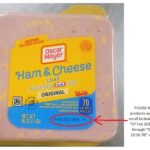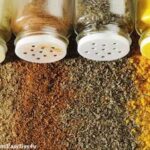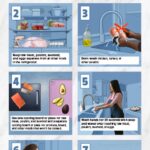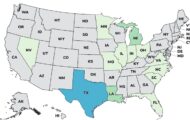Your kitchen sink is an important part of food safety and preventing foodborne illness, according to the USDA. Think about everything you use your sink for: rinsing produce, cleaning pots, pans, plates, cups, and utensils, and discarding meat and produce scraps. All of those things can carry pathogenic bacteria. The USDA recently completed a study looking at how consumers handle food and how good they are at preventing cross-contamination. Participants prepared a meal with raw sausage, shell eggs, and a fruit salad made with cantaloupe. That study showed that the kitchen sink was the most cross-contaminated part of the kitchen at 34%. And 26% of samples of cut-up cantaloupe removed from the completed fruit salad was contaminated with bacteria. There are several ways this can … [Read more...]
USDA Study on Consumer Food Preparation Behavior Highlights Risks
A USDA study on consumer food preparation behavior highlights the risks of not following food safety rules. The five year study looked at how consumers prepare meals in light of the risks of food poisoning. The study was produced by the USDA's Food Safety and Inspection Service (FSIS) as part of their efforts to educate the public about safe food handling practices. USDA Under Secretary for Food Safety Dr. Emilio Esteban said in a statement, "These studies are important for USDA to understand consumer behaviors in the kitchen and it is timely to be releasing the latest findings during Food Safety Education Month. The results allow us to shape food safety communications and help consumers safely prepare food." The three areas the study concentrated on were handwashing, thermometer … [Read more...]
Oscar Mayer Ham & Cheese Loaf Recalled Cross-Contamination
Oscar Mayer Ham & Cheese Loaf is being recalled for potential cross-contamination in the plant from possibly under-processed products. No confirmed reports of illness have been reported to date in connection with the consumption of this product. The recalling firm is Kraft Heinz Foods Company of Kirksville, Missouri. The ready-to-eat ham and cheese loaf products were produced on October 10, 2022. The recalled product is 16 ounce rigid vacuum-packed packages that contain Oscar Mayer Ham & Cheese Loaf. The codes that are on the label range from “07 Feb 2023 20:40 7B” through “07 Feb 2023 22:16 7B”. The loaf has the establishment number Est. 537V that is stamped inside the USDA mark of inspection. They were shipped to distribution centers in Ohio and Virginia, then distributed … [Read more...]
Thanksgiving Food Safety Tips From the USDA
Thanksgiving food safety tips from the USDA will help you keep your family and friends safe as you celebrate the holiday this year. Follow the basic four steps to food safety - clean, separate, cook, and chill. But there are other tips you need to keep in mind. Handwashing is the first step to avoiding any foodborne illness. Wash your hands with soap and water for at least 20 seconds before you start preparing food, after using the bathroom, and before serving food and eating. Also wash your hands after you handle raw meat, poultry, fish, seafood, and eggs. Avoid cross-contamination by cleaning and sanitizing any surfaces that have touched raw turkey and its juices. That includes counters, sinks, stoves, tabletops, utensils, and plates. Also use separate cutting boards for meat … [Read more...]
Did You Know Spice Containers Can Be Contaminated?
We often talk about how to protect yourself against food poisoning in the kitchen. You know about preventing cross-contamination, and using a food thermometer, and washing your hands and utensils. But did you know that spice containers can be contaminated with pathogens? A study conducted at Rutgers and published in the Journal of Food Protection details this information. Almost half of spice containers can be contaminated while working in the kitchen, according to the study. In the study, 48% of spice containers sampled showed evidence of cross-contamination during food preparation. In fact, those containers had the highest pathogen marker concentration of all kitchen surfaces, including trash can lids. Observational studies and self-reporting shows that consumers often use … [Read more...]
Salmonella Enteritidis Outbreak in Canada Sickens 63; No Source Found
A Salmonella Enteritidis outbreak in Canada has sickened at least 63 people in six provinces, but public health officials have not identified a source of the pathogen. Officials are sharing this information to inform consumers how to avoid Salmonella infections. There is another Salmonella outbreak in that country that has sickened more than 500 people. That outbreak is linked to frozen breaded raw chicken and other raw chicken products. The case count by province is British Columbia (23), Alberta (10), Saskatchewan (8), Manitoba (10), Ontario (10), and Quebec (2). Illness onset dates range from November 2018 through March 2019. The patient age range is from 1 and 87 years. Eighteen people have been hospitalized because their illness is so serious. Two deaths have been reported, but … [Read more...]
Kitchen Towels Contaminated with Bacteria, According to New Study
Tea towels, or kitchen towels, can cause cross-contamination in the kitchen, leading to food poisoning, according to a study posted in ASN Microbe 2018. Cross-contamination is when bacteria are spread from one source to food that was not previously contaminated. The study was conducted at the University of Mauritius. The study's authors collected 100 kitchen towels from homes after they were used for one month. Bacteria were collected from the towels and identified. In addition, those participating in the study where asked to fill out a questionnaire designed to pinpoint risk factors. Bacterial growth was found in 40% of the tea towels. The bacteria "significantly increased" by the size of the family, extended family, and the presence of children in the family. Multipurpose … [Read more...]














